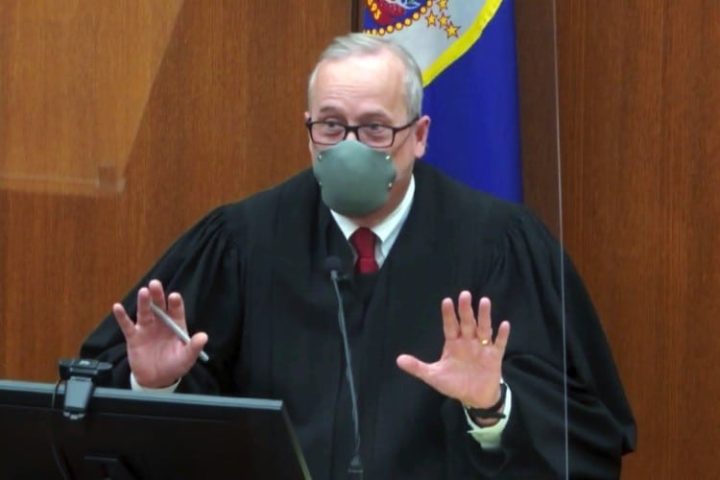
On June 25, Judge Peter Cahill, who presided over the trial and conviction of Derek Chauvin in the “murder” of George Floyd, will sentence the hated former cop.
And on Tuesday, the Hennepin County District Court released Cahill’s “findings” that answered an aggravated sentencing motion from prosecutors. They want an “upward sentencing departure” to punish Chauvin with more time in prison that a defendant would normally receive.
Cahill agreed with four of five points prosecutors put forward on April 30. That means Chauvin might land a life sentence.
Cahill’s findings suggest that leftist law professor Alan Dershowitz was right: Just as the jury obviously feared the mob when it sentenced Chauvin, Cahill will over-sentence him because he, too, knows what’s coming if he doesn’t.
The Findings
Despite an autopsy that showed Floyd had taken a “fatal” dose of fentanyl and had serious cardiovascular disease, the jury found Chauvin guilty of two counts of murder and one count of manslaughter. Chauvin had restrained Floyd with a knee to the neck and upper back. Antifa and Black Lives Matter terrorists staged riots and destroyed cities nationwide after Floyd’s unfortunate death.
Cahill’s “findings are based on the evidence at trial, the facts the jury must have found to convict Chauvin, and on the verdict itself,” Powerline blogger Scott Johnson wrote. “By the time we reach finding 4 — ‘Defendant committed the crime as a group [sic] with the active participation of three other persons’ — they take on an absurd quality.” Johnson observed that the presumptive sentence is 12-and-a-half years.
“Defendant abused a position of trust and authority,” Cahill found, for six reasons, the first being that he caused Floyd’s death. Second, Chauvin “held a position of trust and authority with respect to the community and its members with which he had contact,” he wrote:
The trust placed in Defendant included trust that anyone arrested would be treated with respect and only with reasonable force and that medical needs would be addressed in a timely fashion.
Third, Chauvin and his fellow officers restrained Floyd for an “inordinate amount of time” in “a position that Defendant knew from his training and experience carried with it a danger of positional asphyxia.” Chauvin continued the restraint after Floyd said “he was unable to breathe and expressed the view that he was dying,” and other officers told Chauvin that Floyd had passed out. Yet Chauvin continued the restraint, the judge wrote.
Fourth, Chauvin did not render medical aid and ignored officers who said Floyd should be rolled on his side. Chauvin also stopped bystanders from helping Floyd, Cahill wrote.
The use of his knee on Floyd was unauthorized, the judge wrote, and an “egregious abuse of the authority to subdue and restrain because the prolonged use of this maneuver was employed after George Floyd had already been handcuffed and continued for more than four and a half minutes after Mr. Floyd had ceased talking and had become unresponsive.”
“Defendant treated George Floyd with particular cruelty” because of those facts, Cahill wrote:
It was particularly cruel to kill George Floyd slowly by preventing his ability to breathe when Mr. Floyd had already made it clear he was having trouble breathing.
The slow death of George Floyd occurring over approximately six minutes of his positional asphyxia was particularly cruel in that Mr. Floyd was begging for his life and obviously terrified by the knowledge that he was likely to die but during which the Defendant objectively remained indifferent to Mr. Floyd’s pleas.
Cahill agreed with prosecutors that “children were present during the commission of the offense,” and that Chauvin “committed the crime as a group with the active participation of at least three other persons.”
Cahill did not agree that Floyd “was particularly vulnerable” because he was stoned; that is, Chauvin did not “exploit” the fentanyl overdose to kill Floyd. Chauvin the other three officers simply killed Floyd with the restraint.
Judge Aggravated Sentencing PdfTwo of Chauvin’s counter arguments to the prosecutors’ sentencing memorandum are particularly notable. First, his motion said, the claim that he “did not provide medical assistance to Mr. Floyd is specious at best. Officers called an ambulance before the struggle with Mr. Floyd began, and upgraded the call during the struggle.”
Second, Chauvin replied, “‘abuse of a position of authority’ in the commission of a nonfinancial crime is not recognized as an aggravating sentencing factor in the Minnesota Sentencing Guidelines.”
Minnesota law recognizes exceptions, the answer said. But those involved “criminal sexual conduct, domestic abuse, or both, where the victim had a pre-existing relationship with the offender. Many such cases involved a minor victim, and none of them involved a police officer.”
Chaufin Sentencing PDF Prosecutors Sentencing PDFDershowitz Warning
Weeks ago, Dershowitz argued that the conviction should be overturned on appeal because Representative Maxine Waters (D-Calif.) and others threatened riots if the jury acquitted Chauvin. But he also warned that Cahill, like the jury, would fear the mob.
“It is potentially life in prison,” Dershowitz said. “The judge has some hard decisions to make, but the judge will sentence to a very substantial sentence, which might be the equivalent of life in imprisonment for a person the age of Chauvin.”
Asked what the judge would use to determine the sentence given that Chauvin has no prior convictions, Dershowitz said the judge would do what he appears ready to do, apropos of his aggravated sentencing findings.
“Unfortunately, he’s probably putting his finger up to the wind and seeing what sentence he should impose that wouldn’t result in all kinds of riots,” Dershowitz said:
The whole judicial system has been corrupted by identity politics and by the weaponization of the criminal justice system toward particular agendas. So, I’m not confident this judge will impose the sentence he would normally impose if the world weren’t watching.
I suspect the sentence will be somewhat higher than what was generally imposed in similar cases.



